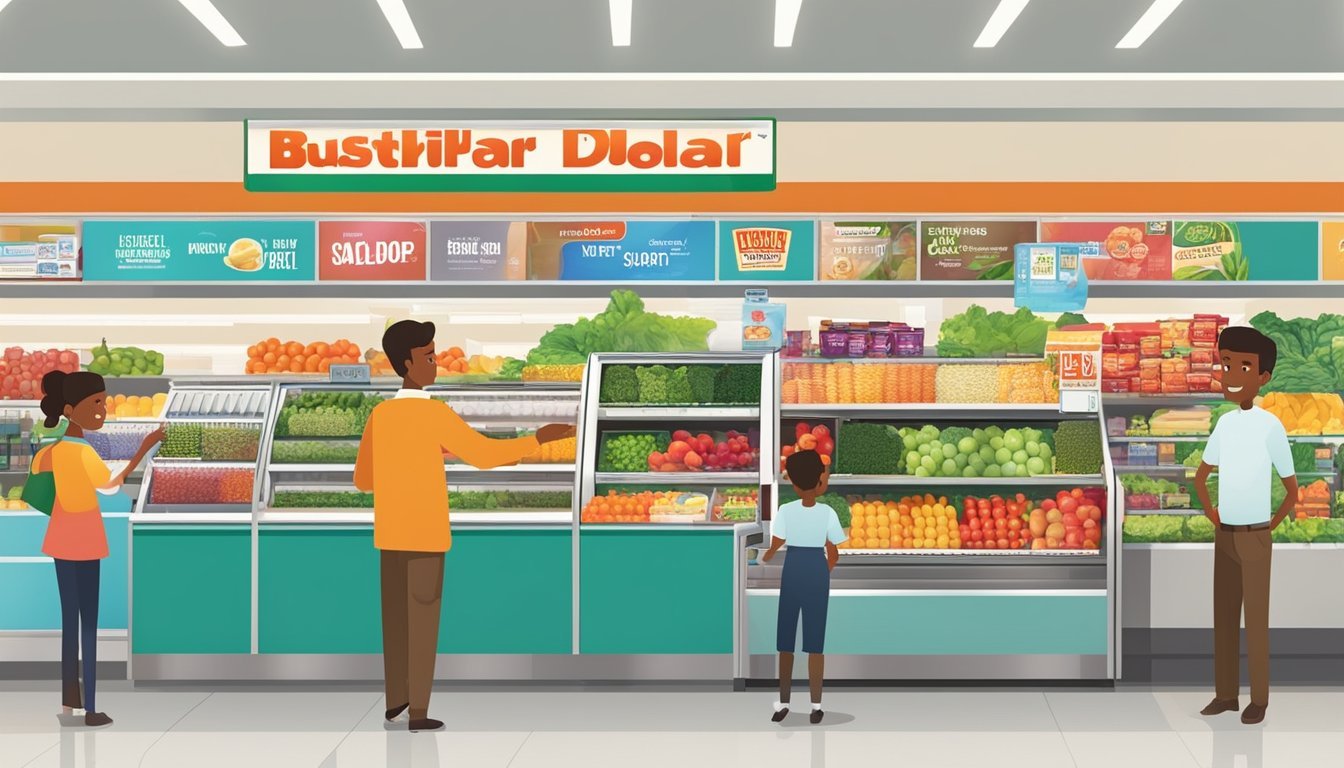Family Dollar vs Ingles Markets
Comparing Prices, Selection, and Customer Experience
Family Dollar and Ingles Markets are two prominent grocery store chains competing for customers' attention and wallets. Both offer a range of products, from groceries to household essentials, but cater to different market segments.
Family Dollar focuses on providing affordable options, often in smaller store formats. The chain emphasizes value and convenience, making it popular among budget-conscious shoppers. Ingles Markets, on the other hand, offers a more traditional grocery shopping experience with larger stores, wider product selections, and fresh produce departments.
While Family Dollar may have an edge in terms of pricing on certain items, Ingles Markets typically provides a broader range of choices, especially in fresh foods and specialty products. The competition between these two chains highlights the diverse needs of grocery shoppers, from those seeking the lowest prices to those prioritizing variety and quality.
Corporate Overview
Family Dollar and Ingles Markets are two distinct retailers in the American grocery landscape. Each has carved out its own niche, with Family Dollar focusing on discount merchandise and Ingles Markets operating as a regional grocery chain.
History of Family Dollar
Family Dollar began in 1959 when Leon Levine opened his first store in Charlotte, North Carolina. The company rapidly expanded, targeting low and middle-income shoppers with a variety of merchandise at discounted prices. By 1970, Family Dollar had 50 stores.
The retailer went public in 1970, fueling further growth. Family Dollar's expansion continued steadily, reaching 1,000 stores by 1985. The company focused on smaller towns and rural areas, often in locations overlooked by larger retailers.
In 2015, Dollar Tree acquired Family Dollar for $8.5 billion. Today, Family Dollar operates over 8,000 stores across 46 states, offering a mix of national brands and private label products.
History of Ingles Markets
Ingles Markets was founded in 1963 by Robert Ingle in Asheville, North Carolina. Ingle's vision was to provide customers with high-quality products at reasonable prices. The company grew steadily, focusing on the southeastern United States.
Ingles Markets went public in 1987, trading on NASDAQ under the ticker symbol IMKTA. The retailer maintained its regional focus, expanding to six states: North Carolina, South Carolina, Georgia, Tennessee, Alabama, and Virginia.
As of 2024, Ingles Markets operates over 200 supermarkets. The company is known for its large stores, often featuring in-store pharmacies, fuel centers, and local produce sections. Ingles has maintained its family-run character, with Robert Ingle's descendants still involved in management.
Store Locations and Accessibility
Family Dollar and Ingles Markets have distinct geographical footprints and store networks. Their accessibility varies based on regional presence and number of locations.
Family Dollar Presence
Family Dollar boasts a widespread presence across the United States. The chain operates over 8,000 stores in 46 states. Urban areas and small towns often have multiple Family Dollar locations, making them easily accessible to many shoppers.
Family Dollar stores are typically found in strip malls, standalone buildings, and neighborhood shopping centers. This placement strategy aims to serve local communities conveniently.
The company's store locator tool on its website helps customers find nearby locations. It also provides information on store hours and services offered at each site.
Ingles Markets Footprint
Ingles Markets maintains a more focused regional presence. The company operates approximately 200 stores across six southeastern states: Georgia, North Carolina, South Carolina, Tennessee, Alabama, and Virginia.
Ingles Markets tends to establish larger supermarket-style stores in suburban and rural areas. These locations often serve as anchor stores in shopping centers or as standalone buildings with ample parking.
The chain's store in Locust Grove, Georgia (#495) is an example of its typical setup. It includes a pharmacy and offers curbside pickup services, demonstrating Ingles' commitment to customer convenience in its regional stronghold.
Price Comparison
Family Dollar and Ingles Markets offer different pricing strategies for groceries and household items. Their approaches to everyday prices and discounts vary, impacting overall savings for shoppers.
Everyday Prices
Family Dollar focuses on providing low-cost options for basic necessities. Many items are priced at $1 or less, making it attractive for budget-conscious consumers. Their limited selection of groceries tends to be competitively priced against discount stores like Aldi.
Ingles Markets, a full-service grocery chain, typically has higher everyday prices than Family Dollar. However, Ingles offers a wider range of products, including fresh produce, meats, and name-brand items. Their pricing is generally competitive with other traditional supermarkets.
Discounts and Savings
Family Dollar runs weekly sales and offers digital coupons through their app. They frequently discount household essentials and personal care items. Their "Smart Coupons" program allows customers to load digital coupons directly to their account for additional savings.
Ingles Markets provides more diverse savings opportunities. They offer a loyalty card program, weekly circular deals, and digital coupons. Ingles also features "Buy One, Get One Free" promotions and fuel rewards for additional value. Their broader selection allows for more varied discounts across different product categories.
Product Range and Quality
Family Dollar and Ingles Markets offer distinct product selections and quality levels to meet different customer needs. Their offerings vary across key grocery categories, impacting shoppers' choices.
Fresh Produce Selection
Family Dollar provides a limited selection of fruits and vegetables, focusing on basic staples like apples, bananas, potatoes, and onions. The produce quality can be inconsistent, with items sometimes nearing expiration.
Ingles Markets boasts a more extensive fresh produce section. Shoppers find a wider variety of seasonal fruits and vegetables, including organic options. The quality is generally higher, with fresher items and better storage conditions.
Ingles typically offers in-store sampling of produce and employs dedicated staff to maintain the section. This attention to detail results in a more appealing presentation and longer-lasting produce.
Meat and Dairy
Family Dollar's meat selection is primarily limited to packaged and processed options like hot dogs, bacon, and lunch meats. The dairy section includes basic items such as milk, eggs, and cheese.
Ingles Markets features a full-service meat counter with butchers on staff. Customers can find a wider range of fresh cuts, poultry, and seafood. The quality is generally higher, with options for organic and locally sourced meats.
Ingles' dairy section is more comprehensive, offering a variety of milk types, yogurts, cheeses, and specialty dairy products. The selection includes both national brands and local options.
Pantry and Dry Goods
Family Dollar excels in offering budget-friendly pantry staples. Shoppers find a good selection of canned goods, pasta, rice, and cereals at competitive prices. The focus is on affordable, name-brand and private-label options.
Ingles Markets provides a broader range of pantry items, including more premium and specialty products. The selection encompasses a variety of pasta shapes, grains, and international foods. Ingles typically stocks a larger assortment of baking supplies and spices.
Both stores offer similar basic items, but Ingles tends to have more variety in each category. Family Dollar's strength lies in its lower prices for everyday essentials.
Frozen and Packaged Foods
Family Dollar's frozen food section is compact but covers essential items. Shoppers find frozen vegetables, pizzas, and budget-friendly TV dinners. The selection prioritizes convenience and affordability over variety.
Ingles Markets offers a more extensive frozen foods department. The selection includes a wider range of vegetables, fruits, prepared meals, and premium ice cream brands. Ingles also stocks more health-conscious and specialty diet frozen options.
In packaged foods, Family Dollar focuses on popular snacks and convenience items. Ingles provides a larger variety, including more natural and organic packaged goods.
Specialty Items and Bakery
Family Dollar's specialty food offerings are limited. The store may carry a small selection of international foods and basic baking supplies. There is typically no in-store bakery.
Ingles Markets shines in this category with a dedicated bakery department producing fresh bread, cakes, and pastries daily. The store offers a wider range of specialty items, including gourmet cheeses, olive bars, and international foods.
Ingles also tends to stock more dietary-specific products such as gluten-free, vegan, and keto-friendly options. This broader selection caters to diverse customer preferences and dietary needs.
Shopping Experience
Family Dollar and Ingles Markets offer distinct shopping experiences for customers. Their approaches to store layout, cleanliness, and customer service shape how shoppers interact with each retailer.
Store Layout and Navigability
Family Dollar stores typically have a compact layout with narrow aisles. Products are organized by category, with household items, food, and personal care goods in separate sections. The smaller footprint can make navigation quick for shoppers with short lists.
Ingles Markets feature wider aisles and a more spacious layout. Their stores include expanded departments like produce, bakery, and deli. This layout accommodates customers doing larger grocery trips. Signage in Ingles is often clearer, helping shoppers locate items more easily.
Both stores place popular items strategically to encourage impulse purchases. Family Dollar's layout emphasizes affordability, while Ingles focuses on variety and fresh options.
Cleanliness and Organization
Family Dollar stores can vary in cleanliness. Some locations maintain tidy shelves and floors, while others struggle with organization during busy periods. Restocking often occurs during store hours, which can create temporary clutter.
Ingles Markets generally prioritize cleanliness. Their larger staff allows for more frequent cleaning and organizing. Produce sections are usually well-maintained, with regular rotation of fresh items.
During the pandemic, both chains implemented enhanced cleaning protocols. Ingles Markets often received higher marks for consistent sanitization practices and maintaining stock levels.
Customer Service
Family Dollar operates with a lean staff model. This can result in longer checkout lines during peak hours. Employees are trained to be efficient, focusing on quick transactions.
Ingles Markets typically have more staff available. This allows for dedicated personnel in specialized departments like the deli or bakery. Customers often find it easier to locate assistance when needed.
Both stores have implemented self-checkout options in many locations. Ingles tends to offer more personalized service, with employees available to answer product questions or provide recommendations.
Convenience Services
Family Dollar and Ingles Markets offer various convenience services to enhance the shopping experience. These range from digital options to in-store amenities designed to save time and effort for customers.
Online Shopping and Delivery
Family Dollar provides a basic online shopping platform where customers can browse products and place orders for in-store pickup. The service allows for easy meal planning and quick item selection. Ingles Markets, on the other hand, offers a more comprehensive online shopping experience. Customers can shop for groceries through the Ingles website or mobile app, choosing between curbside pickup and home delivery options.
Ingles partners with Instacart for same-day delivery, making it convenient for those who prefer to avoid in-store shopping. Family Dollar does not currently offer home delivery services.
In-Store Additional Services
Both retailers provide additional services within their stores to enhance convenience. Family Dollar typically includes Western Union money transfer services and bill payment options. Some locations also feature RedBox movie rentals.
Ingles Markets offers a wider array of in-store services. Many Ingles stores have pharmacies, fuel centers, and Starbucks cafes. Some locations provide coin counting machines and money order services. Ingles also features in-store banks at select locations, allowing customers to handle financial transactions while grocery shopping.
Both chains accept EBT cards, making them accessible to customers using SNAP benefits.
Consumer Programs and Community Involvement
Family Dollar and Ingles Markets offer various programs to enhance customer experience and support local communities. Both chains prioritize customer loyalty, sustainable practices, and charitable initiatives.
Loyalty Programs
Family Dollar's Smart Coupons program allows customers to clip digital coupons and save them to their account. Shoppers can access these deals through the mobile app or website. The program offers personalized savings based on purchase history.
Ingles Markets operates the Ingles Advantage Card. This loyalty program provides exclusive discounts and fuel savings at Ingles Gas Express stations. Cardholders earn points on purchases, which can be redeemed for grocery discounts or gas savings.
Both programs aim to reward frequent shoppers and encourage repeat visits. Family Dollar's approach focuses on digital coupons, while Ingles offers a more traditional points-based system with added fuel benefits.
Sustainability and Local Products
Family Dollar has implemented energy-efficient lighting and refrigeration systems in many stores to reduce environmental impact. The chain also works with suppliers to minimize packaging waste.
Ingles Markets emphasizes local sourcing, partnering with regional farmers and producers. The company operates its own dairy, providing fresh milk to stores. Ingles also offers a wide selection of locally-grown produce.
Both chains have taken steps towards sustainability, but Ingles stands out for its strong focus on local products. This approach supports regional economies and reduces transportation-related emissions.
Charity and Local Support
Family Dollar partners with Boys & Girls Clubs of America, supporting after-school programs and youth development initiatives. The chain also conducts in-store fundraising campaigns for various causes.
Ingles Markets operates the Ingles Tools for Schools program, which donates school supplies to local educational institutions. The company also supports food banks and disaster relief efforts in its operating areas.
Both retailers demonstrate commitment to their communities through charitable giving. Family Dollar's focus on youth programs complements Ingles' emphasis on education and hunger relief. These initiatives help strengthen ties with local customers and improve brand perception.
Final Verdict
Family Dollar and Ingles Markets each have their strengths for budget-conscious shoppers. Family Dollar offers rock-bottom prices on many household staples and non-perishables. This makes it ideal for stocking up on pantry items and cleaning supplies.
Ingles Markets generally provides fresher produce and a wider selection of groceries. Their prices on fruits, vegetables, and meats tend to be competitive, especially with weekly sales.
For a family of 4 planning breakfasts, lunches, and dinners, Ingles may be the better overall choice. Their broader inventory allows for more meal variety and healthier options.
Family Dollar shines for supplementing grocery lists with inexpensive snacks and sweet treats. Their $1 candy and chip selections can't be beat for occasional indulgences.
Cost-conscious shoppers can maximize savings by splitting their purchases. Buying non-perishables and household goods at Family Dollar, then fresh items at Ingles, often results in the lowest total grocery bill.
Ultimately, the best choice depends on individual needs, preferences, and local store quality. Comparing prices on frequently purchased items at both stores can help determine the most cost-effective option for each family's specific grocery list.









